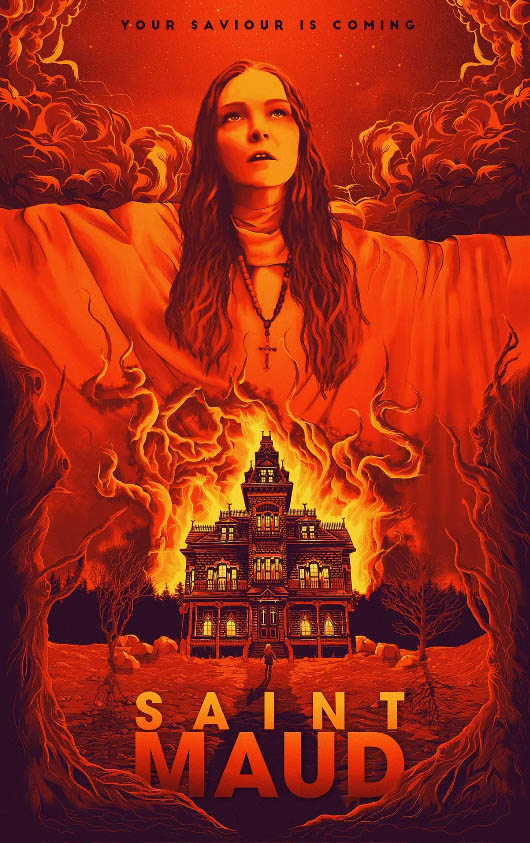For long stretches of “Saint Maud”, writer-director Rose Glass’ feature directorial debut, the psychological horror seems to be on the cusp of something. The tension feels drawn to its very limits and we seem just about to discern something newer, something specific, or something tangible. Depending on your own reading, that ‘something better’ might be the final shot of the film, which offers the closest thing resembling any kind of release in the film. Yet, I wrestled with the almost studied ambivalence of “Saint Maud”.
When we meet Maud (a name she has newly adopted), our purported saint, she is working as a carer for Amanda, a terminally-ill dancer and choreographer with stage four lymphoma. Amanda is confined to a wheelchair, resentful of her illness and concerned about the imminent emptiness of death. Maud, devoutly religious and living a life devoid of any personal desire beyond that religiosity, finds Amanda’s malaise inspiring. That malaise, she decides, is a sign from god. God has sent Amanda to her to perform the miracle of evangelism. She can save Amanda from an atheistic fate and convert her to the wonder of Catholicism. Amanda is, unsurprisingly, less than enthused.
It is not enough for Maud to gently coax Amanda to the light, but to love God – Maud’s jealous God – she must renounce her current sinful life. To cope with her pain and loss, Amanda drinks, enjoys a pleasant relationship with a female sex-worker she sees regularly, and enjoys being maudlin and occasionally cutting. At first, Amanda’s resistance only gives Maud greater surety to her faith, but over time that resistance builds into anger and resentment as religious ardour soon seems to be religious fanaticism. Horror has long been preoccupied with exploring the thin line between faith and fanaticism, but “Saint Maud” feels more like a flirtation than an exploration. This is familiar ground, and ground for potential excellence. “Saint Maud” keeps building, and building, and building. But it never feels as if it reaches its point.
Little by little Glass informs us of key bits of information about Maud. Except they are filtered down to us in deliberately vague ways. Maud, who was once Katie, worked as a nurse but left the job after a tragic mishap with a patient. Glass gives us this information in a circuitous way, suggesting ambiguity – although we’re never sure in service of what. Her religiosity is newfound. After her traumatic work experience, she has turned to Catholicism as a way of coping.
Morfydd Clark, as Maud, plays the intensity of that devotion well. For long stretches of the film, we stay only with her, observing what feels like her descent into madness, but also feels like a believable certainty of one’s own fate. She is unsettling, but she also seems to existing with a clarity we cannot quite understand. It’s ambitious to keep us so firmly locked out of Maud’s interiority, but the film functions so much through Maud that robbing us of any interiority of its main character ends up closing us off from the work itself. There are gripping moments that nod to ideas of isolation as central to belief, about grief, about fear and desire. The sequences where Maud seems both disgusted and desirous of Amanda’s sexual dalliances inject valuable tension into the narrative. But what is in service of?
So much of the film is about suffering. Jennifer Ehle as Amanda is particularly keyed into this, dripping with contempt and self-loathing and turning her rejection of her current state into a sharp presentation of anger and pain. There’s a metaphor somewhere about pointless suffering, though, when Glass seems mostly ambivalent to any of the underpinnings of that suffering. The concept is sharp, but beneath the surface there’s so much haze. Early on, when Maud confesses to hearing god’s voice Ehle’s incredulous look of shock is exacting. As Maud begins to speak of her religious fervour, the sexual connotation is immediate. The film’s best sequence is a moment of prayer made perverse, and erotic, and titillating. It feels like the film is on the cusp of something more daring. And then…it recedes. We keep watching because the startling concepts feel destined for something bigger that we keep waiting for. It’s not bad filmmaking, it just feels incomplete.
And, yet, there’s much to recommend about “Saint Maud” that even my own ambivalence seems punctured by the film’s own surety and the way that it proclaims itself as something to be examined. It’s not even so much a question of whether it’s scary or not – the film never approaches anything resembling true terror for me – so much as it speaks to the unsettling fissures of being very alone and wrestling with that aloneness. It intrigues for those nods to real-world terrors, but that feels less like a matter of the film’s effect and more about the possibilities we might bring to it. For who has not grappled with those feelings of loneliness? Glass’ work here is promising in that way. She has a clear focus of what she wants, and her conceptualisation here is incredibly precise. Even if “Saint Maud” never feels like it goes anywhere completely, it’s not a regrettable ride.
Saint Maud is available for streaming on Prime Video and other platforms.







